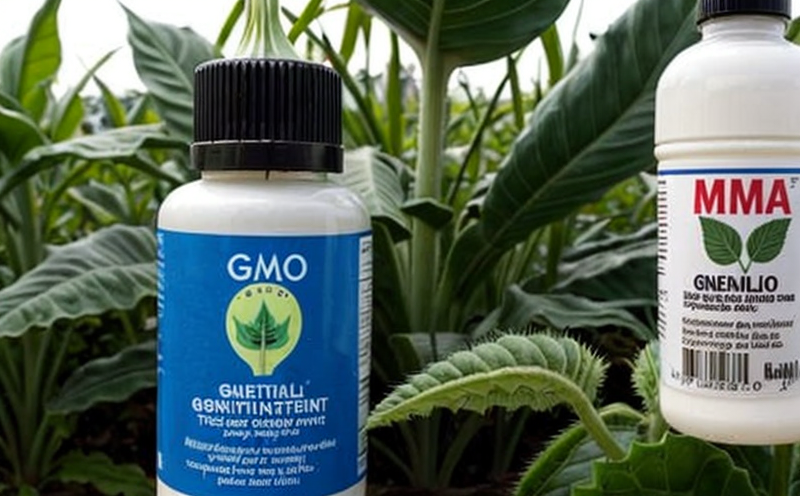ISO 27004 Screening for GM Cotton by PCR
The International Organization for Standardization (ISO) has established ISO 27004:2013, which provides a framework for information security risk management. While this standard is not directly related to genetic testing, it underpins the rigorous and methodical approach required in performing such tests. This service specifically focuses on detecting genetically modified organisms (GMOs) within cotton samples using Polymerase Chain Reaction (PCR).
Cotton, a widely used agricultural product, can be subjected to genetic modification for various reasons: increased resistance to pests, improved yield, or enhanced fiber quality. Ensuring that the cotton sold in compliance with regulations is free from unauthorized modifications is critical for maintaining market integrity and public trust.
Our PCR-based screening service adheres strictly to ISO 17025 standards, ensuring accurate, reliable results. The process involves several key steps:
- Sample Collection and Preparation: Proper sampling is crucial for the success of any genetic test. Samples are collected under strict protocols to ensure they represent the entire batch or field.
- DNA Extraction: High-quality DNA must be extracted from the cotton samples using specialized reagents and techniques.
- PCR Amplification: Once the DNA is prepared, it undergoes PCR amplification targeting specific regions within the genome associated with known GMOs. This step ensures that any genetic modifications can be accurately identified.
- Detection and Analysis: After amplification, the products are analyzed using electrophoresis or real-time PCR to identify the presence of targeted sequences indicative of GMO modification.
The process is not only accurate but also highly sensitive, capable of detecting even trace amounts of modified DNA. This level of precision makes our service indispensable for regulatory compliance and quality assurance in the textile industry.
Our team of experts ensures that all tests are conducted under controlled conditions to minimize the risk of contamination and ensure consistent results across multiple samples. The final report provides a comprehensive analysis, including detailed descriptions of any detected modifications, along with recommendations for further action if necessary.
Industry Applications
Cotton is one of the most widely used fibers in the world, and ensuring its integrity is crucial for maintaining market standards. Our service finds application across various sectors:
- Textile Manufacturers: Ensuring that raw materials are free from unauthorized genetic modifications protects brand reputation and customer trust.
- Agricultural Companies: Compliance with regulations on GM cotton is essential to avoid legal issues and maintain market access.
- Regulatory Bodies: Our service supports the enforcement of GMO labeling laws, ensuring that products are accurately represented in markets.
In addition to these sectors, our service also benefits R&D Engineers who need accurate baseline data for genetic studies. By providing precise information on the presence or absence of specific modifications, we contribute to ongoing research and development efforts aimed at improving cotton varieties without unauthorized genetic manipulation.
Why Choose This Test
The PCR-based screening method is superior in several ways:
- High Accuracy: PCR technology allows for the precise detection of specific DNA sequences, making it highly accurate even when dealing with small sample sizes.
- Rapid Results: The test can provide results within a few days, allowing companies to make timely decisions about their raw materials.
- Compliance Assurance: By adhering strictly to ISO 17025 standards, our service ensures that all tests are conducted in compliance with international best practices.
- Cost-Effective: While initial setup costs may be high, the long-term cost-effectiveness of avoiding legal issues and maintaining market reputation cannot be overstated.
The use of PCR screening not only ensures regulatory compliance but also supports ethical production practices by preventing unauthorized genetic modifications. This service is essential for maintaining the integrity and quality of cotton products in a global market.
Use Cases and Application Examples
- Compliance Verification: Textile companies can use our PCR screening to verify that their raw materials meet regulatory requirements before processing them into finished goods.
- R&D Support: Agricultural research institutions often use PCR technology to study the effects of specific genetic modifications on cotton performance and sustainability.
- Market Entry: Companies planning to enter new markets must ensure that their products comply with local GMO regulations. Our service helps them achieve this by providing accurate, reliable testing results.
In addition to these use cases, our PCR-based screening is also used in legal disputes where the authenticity of cotton samples is in question. By providing clear and accurate genetic profiles, we can help resolve such disputes quickly and effectively.
Our service has been instrumental in several high-profile cases where companies have faced challenges with unauthorized GMOs in their supply chains. In these instances, our PCR screening provided definitive proof that enabled swift resolution of the issues.





